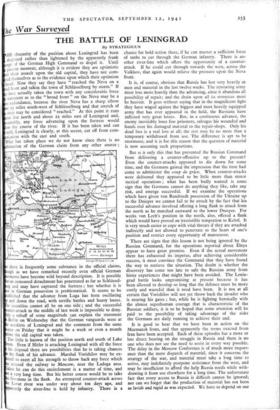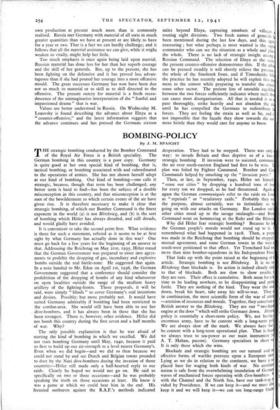1' War Surveyed THE BATTLE OF LENINGRAD
By STRATEG ICUS HE obscurity of the position about Leningrad has been deepened rather than lightened by the apparently frank pt of the German High Command to dispel it. Until present moment, although it is evident they are optimistic t their assault upon the old capital, they have not corn- ed themselves as to the evidence upon which their optimism based. Now they say they have "reached the Neva on a d front and taken the town of Schliisselburg by storm." If v have actually taken the town with any considerable force 'statement as to the "broad front" on the Neva may be a re redundance, because the river Neva has a sharp elbow 15 miles south-west of Schliisselburg and that stretch of river may be considered "reached." At this point it runs ost due north and about 22 miles east of Leningrad and, sumably, any force advancing upon the fortress would ow the course of the river. If it has been taken and can held, Leningrad is clearly, at this sector, cut off from corn- ication with the east and south.
What has taken place we do not know since there is no =don of the German claim from any other source ; there is frequently some substance in the official claims, ough as we have remarked recently even official German tements have become wild beyond description. It is possible an armoured detachment has penetrated as far as Schliissel- g and may have captured the fortress ; but whether it is w in German possession is problematical. It seems to be tablished that the advance from Luga has been oscillating and down the road, with terrific battles and heavy losses.
e casualties cannot all be on one side ; and the successful inter-attack in the middle of last week is impossible to deny. y a rebuff of some magnitude can explain the statement Berlin on Wednesday that the German vanguards were at e outskirts of Leningrad and the comment from the same urce on 'Friday that it might be a week or even a month ore the old capital was taken. Too little is known of the position north and south of Lake en. Even if Hitler is attacking Leningrad with all the force his disposal there are possibilities that he is taking chances the flank of his advance. Marshal Vorishilov may be ex- ted to exert all his strength to throw back any force which crossed the railway to Moscow, near the Ladoga area. aless he can do this encirclement is a matter of time, and a very long time. But his better course would be to take Get mans in the flank. An attempted counter-attack across Lovat river was under way about ten days ago, and PParently the river-line is held by infantry. There is a chance for bold action there, if he can muster a sufficient force of tanks to cut through the German infantry. There is an- other river-line which offers the opportunity of a counter- attack. If he could cut through towards the west, across the Volkhov, that again would relieve the pressure upon the Neva front.
It is, of course, obvious that Russia has lost very heavily in men and material in the last twelve weeks. The retreating army must lose more heavily than the advancing, since it abandons all possibility of repair; and the drain upon all its resources must be heavier. It goes without saying that in the magnificent fight they have waged against the biggest and most heavily equipped army that has ever appeared in the field, the Russians have inflicted very great losses. But, in a continuous advance, the enemy inevitably loses few prisoners, salvages his wounded and hands over his damaged material to the repair-shops. Only his dead loss is a real loss at all; the rest may be no more than a temporary withdrawal from use. The difference is apt to be enormous; and it is for this reason that the question of material is now assuming such proportions.
But is it only this that has prevented the Russian Command from delivering a counter-offensive up to the present? Even the counter-attacks appeared to die down for some time, and the Germans gained the impression that the time had come to administer the coup de grace. When counter-attacks were delivered they appeared to be little more than minor tactical operations ; what has been badly wanted is some sign that the Germans cannot do anything they like, take any risk, and emerge successful. If we examine the operations which have given von Rundstedt possession of the Ukraine up to the Dnieper we cannot fail to be struck by the fact that his successful advance involved offering a long flank to attack from the north as he marched eastward to the lower Dnieper. For weeks von Leeb's position in the north, also, offered a flank which would have proved an irresistible temptation to Keitel. It is very much easier to cope with vital threats if they are attacked indirectly and not allowed to penetrate to the heart of one's position and restrict every opportunity of manoeuvre.
There are signs that this lesson is not being ignored by the Russian Command, for the operations reported about Elnya appear to have great promise. Even if the actual movement there has exhausted its impetus, after achieving considerable success, it must convince the Command that they have found the way to retrieve the situation. The doubt is whether the discovery has come too late to safe the Russian army from bitter experiences that might have been avoided. The Lenin- grad battle looks unpromising at present because it has been allowed to develop so long that the defence must be more costly and wasteful than it need have been. It is not at all certain that Vorishilov will not yet throw back the invader who is nearing his gates ; but, while he is fighting heroically with the almost superhuman courage that is characteristic of the Russian soldiers, it is to be hoped that some attention will be paid to the possibility of taking advantage of the risks the Germans are daily running to achieve their end.
It is good to hear that we have been in action on the Murmansk front, and that apparently the terms exacted from Iran have been accepted. Each of these episodes has a more or less direct bearing on the struggle in Russia and there is no one who does not see the need to assist in every way possible. The delay in the Moscow Conference is of much more import- ance than the mere dispatch of material, since it concerns the strategy of the war, and material must take a long time to arrive, may indefinitely postpone assistance from the west, and may be insufficient to afford the help Russia needs while with- drawing it from use elsewhere for a long time. The unfortunate fact that every access to Russia is difficult cannot be ignored; nor can we forget that the production of material has not been as lavish and rapid as was expected. We have to depend on our own production at present much more than is commonly realised. Russia met Germany with material of all sorts in much greater quantities than we have at present or are likely to have for a year or two. That is a fact we can hardly challenge; and it follows that all the material assistance we can give, while it might weaken us vitally, might help her little.
Too much emphasis is once again being laid upon matrial. Russian material has done less for her than her superb courage and the skill of her generals. But, up to the present, she has been fighting on the defensive and it has proved less advan- tageous than if she had poured her courage into a more offensive mould. The great successes Germany has won have been due not so much to material or to skill as to skill directed to the offensive. The present outcry for material is a fresh recru- descence of the unimaginative interpretation of the "fearful and impassioned drama" that is war.
Values are better understood in Russia. On Wednesday M. Lozovsky is found describing the advance about Elnya as a "counter-offensive," and the latest information suggests that the advance continues and has pressed the Germans sixteen miles beyond Elnya, capturing nambers, of villages routing eight divisions. Two fresh names of generals been mentioned during the last few days, and this agail reassuring ; but what perhaps is most wanted is the sup commander who can see the situation as a whole and plz the whole. There is no lack of strategic insight among Russian Command. The selection of Elnya as the scene the present counter-offensive demonstrates this. If the adv can be pressed steadily it will shortly relieve the pressure the whole of the Smolensk front, and if Timoshenko foll the practice he has recently adopted he will exploit this ment to the utmost while preparing to transfer the attack some other sector. The preient line of unstable equili between the two forces sufficiently indicates where such th can cause most disorganisation. All that is needed is to pare thoroughly, strike heavily and not abandon the a until he has compelled the Germans to redistribute forces. They are feeling the strain as well as he, and not impossible that the façade they show towards the us more brittle than they would care for anyone to know.



























 Previous page
Previous page